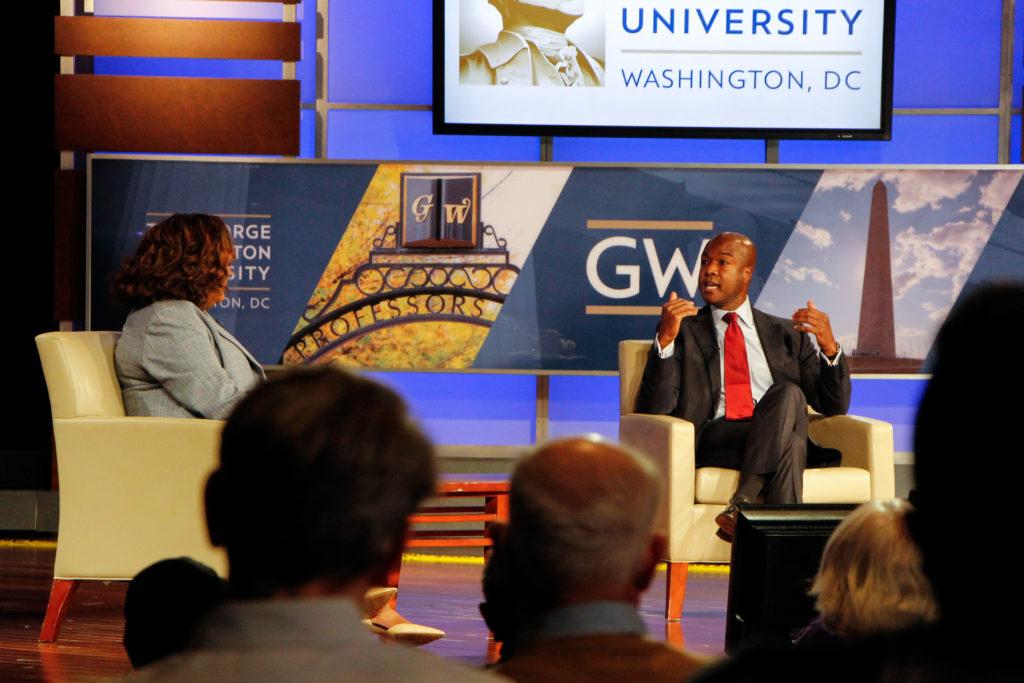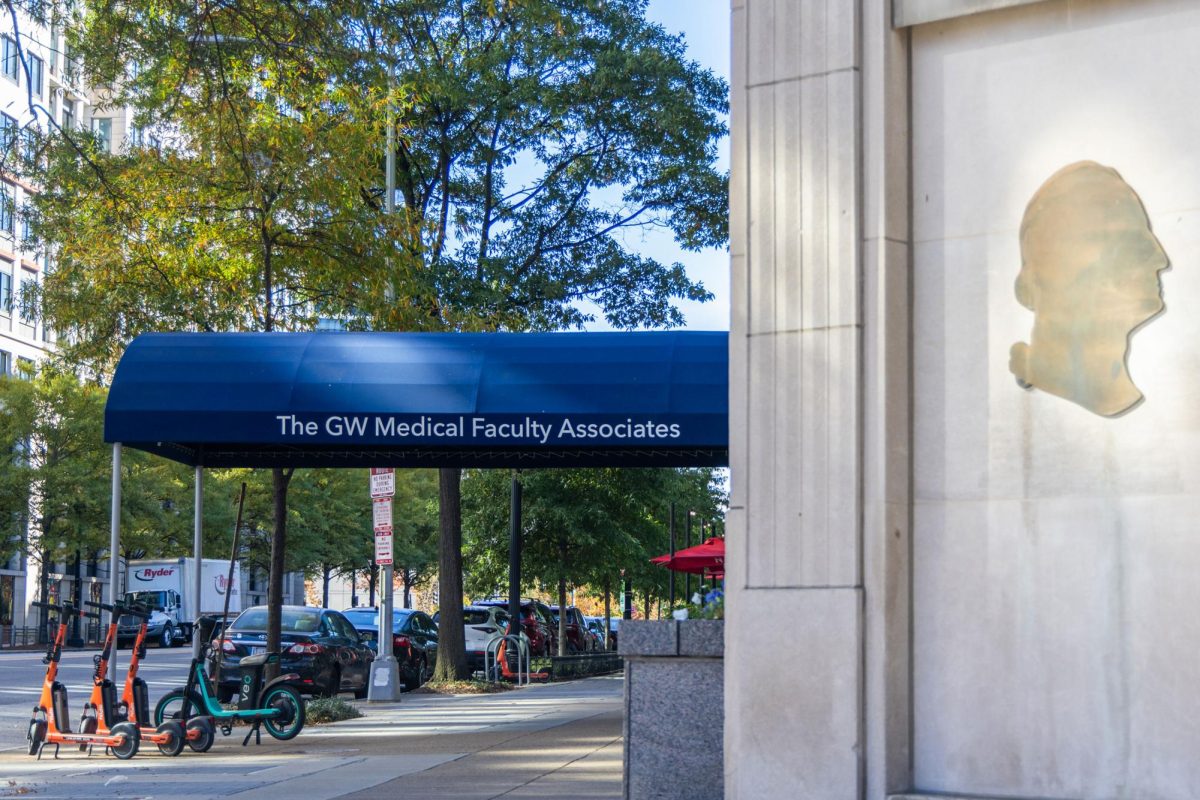A former D.C. mayoral candidate filed a lawsuit against the University and professor Cheryl W. Thompson last month, accusing Thompson of slander and inflicting emotional distress for comments she made while moderating a mayoral candidate forum at GW in April.
James Butler, a former Democratic candidate for D.C. mayor, alleges in the complaint that Thompson slandered him when she brought up his disbarment and said he broke the law while she moderated the forum in the Jack Morton Auditorium. Butler is suing for $575,000 on claims of intentional infliction of emotional distress, false light, slander and vicarious liability.
University spokesperson Julia Metjian said the University does not comment on pending litigation but “looks forward” to responding to Butler’s allegations in court. Thompson, an associate professor of journalism and an investigative correspondent at NPR, did not return a request for comment.
Thompson moderated the mayoral candidate forum in April that GW hosted in collaboration with the League of Women Voters DC, a non-partisan organization encouraging informed and active citizen participation in government.
Thompson individually interviewed five candidates – Butler, Mayor Muriel Bowser, At-large D.C. Council member Robert White, Ward 8 Council member Trayon White and comedian Rodney Grant on major issues in the 2022 mayoral election. Candidates joined Thompson on stage in a randomly-generated order, and each candidate had two minutes to provide an opening statement followed by a 15-minute question-and-answer period.
Thompson asked Butler about how he planned to rid D.C. of illegal firearms, how he would improve D.C. Public Schools and what he meant in a 2018 interview when he said he would turn over control of D.C. schools to an “independent body” if he won the mayoral election, which he was running in at the time.
Near the end of Butler’s segment, Thompson posed a question about his disbarment, asking how voters could “trust” someone to uphold the law after violating it.
In response to her question, Butler said he never broke any laws nor was he ever charged with doing so. He admitted that he committed ethical violations while practicing law but was not forcibly disbarred, and he voluntarily surrendered his law license and consented to disbarment.
“That is a complete misstatement that I broke a law,” he said during the forum, according to a video of the event uploaded by WUSA9. “I was never charged. There was no discussion of charging me.”
Beginning in 2007, the Office of Bar Counsel – responsible for disciplinary actions against D.C. attorneys – started to receive complaints from Butler’s former clients accusing him of neglect, lack of communication, intentional failure to pursue their lawful interests, dishonest advertising, failure to return files, failure to return unearned fees, dishonest statements and failure to supervise attorneys working for him.
A majority of the complaints originated from incarcerated clients who hired Butler’s firm to assist them in appealing their criminal convictions. Butler told The Washington Post in May that he was in over his head as a young attorney and that he lacks the financial resources to pay back the DC Bar’s Client Security Fund, which reimbursed more than $650,000 to his former clients.
Following Butler’s interview, Thompson introduced At-large D.C. Council member Robert White Jr. for questioning. After White noticed his two minutes to introduce himself were nearly up, he prompted Thompson to ask him questions.
“I see that my time is up so let me get ready for these questions,” he said.
Thompson laughed and responded “Well, unless you were disbarred, it’s going to be a little easy,” to which an audience member yelled “personal attacks” in response. “It is true,” Thompson replied, according to the complaint.
Under D.C. law, Butler must be able to prove the conduct was “extreme and outrageous” and that Thompson had the “intent or knowledge” that severe emotional harm would occur in order to win the lawsuit, according to the complaint.
Butler alleges in the complaint Thompson’s comments qualify as outrageous conduct because she “attacked” him while he was off stage and could no longer defend himself, alleging she became “verbally combative” with audience members.
The complaint said it is unlikely the lawsuit would be filed had it been a “random confrontation,” but Thompson’s behavior as a “seasoned reporter” moderating a forum for mayoral candidates in the District was “extreme.”
Butler said in the complaint her comments “hurt and diminished” him in the eyes of voters and caused him to suffer emotional harm.
“Being out on the campaign trail, being my second time running for office, you can’t be a weak person doing that,” Butler said in an interview. “I just thought it was so blatantly unfair, and it never left my mind and it caused a lot of emotional distress.”
Butler said although voters have a right to ask questions regarding his past legal practices and disbarment, Thompson’s comments felt like a “personal attack.”
“This is about a moderator who failed to remain neutral, detached and unbiased and interfered with an interview process for candidates running for mayor of the District of Columbia,” he said.
Butler alleges the University’s awareness of the incident, employment of Thompson and subsequent failure to pursue disciplinary action against her renders them responsible for the consequences of the forum.
“I believe that Thompson did these things intentionally, and I believe the University knew what she did and failed to act, either prior to – vetting her properly that would be – or subsequently, and I believe they’re very carelessly liable for the actions that occurred,” Butler said.
The complaint states Thompson “clearly” lost her neutrality and engaged in political activity to oppose Butler’s mayoral bid while acting on behalf of the University.
Butler said he spoke with University officials in a dean’s office within the week after the event, and one individual who “appeared to be high up” said they found nothing wrong with Thompson’s behavior in the video. Butler said he could not recall whom he spoke to in the administration.
“Well, maybe a trier of fact, a judge or jury, will see what she did wrong,” Butler said.











